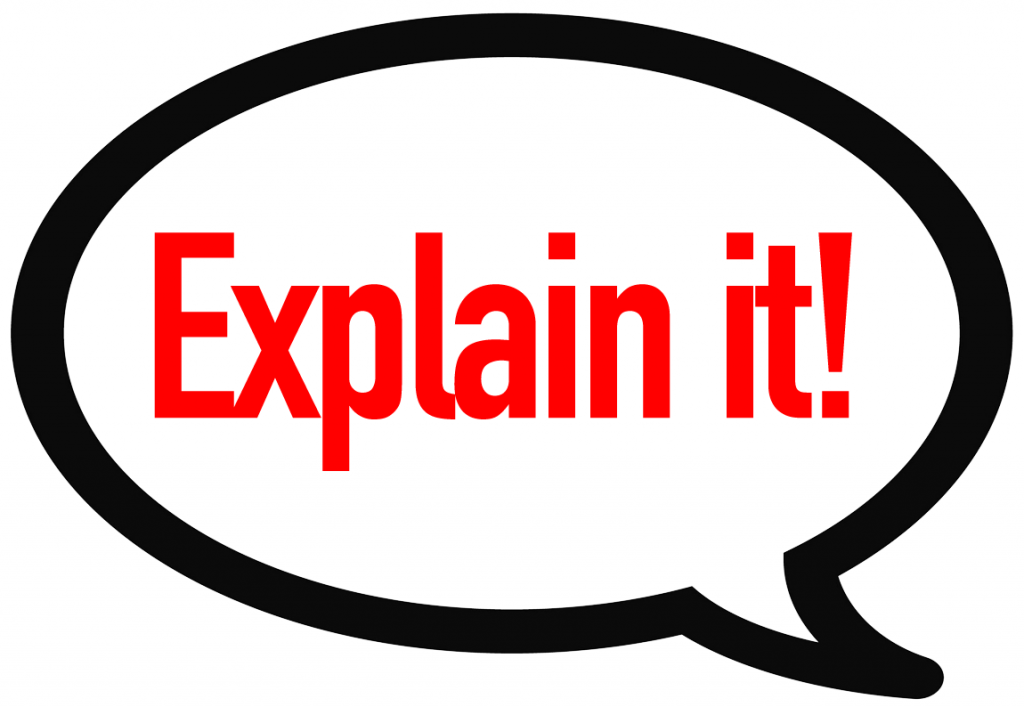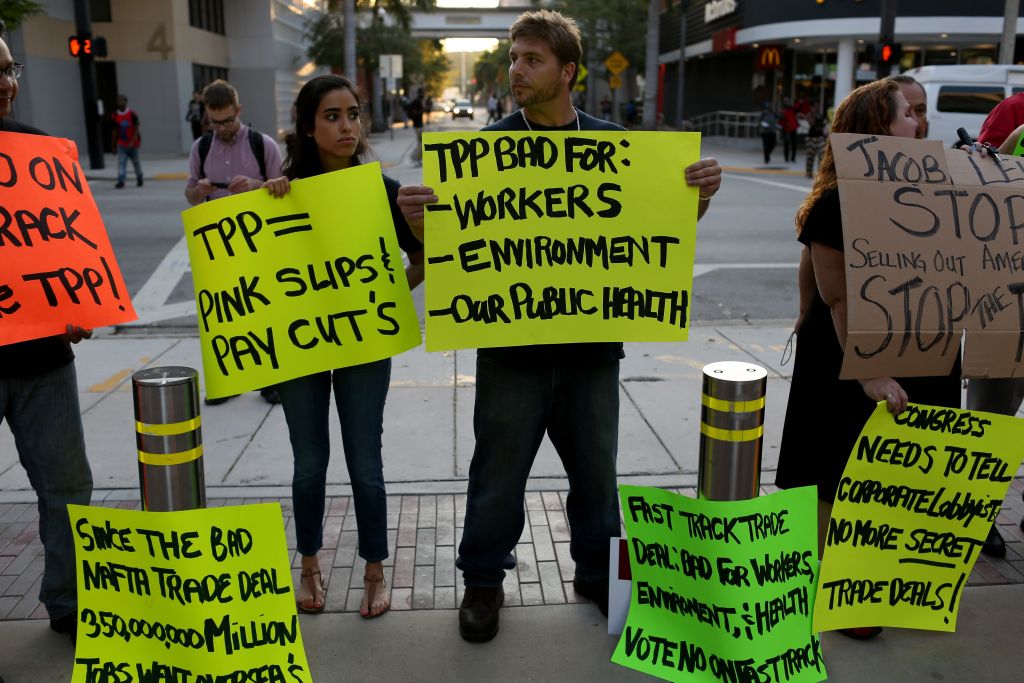President Obama hasn’t given up on getting the 12-nation, Trans-Pacific Partnership (TPP) trade deal through Congress. Our recent piece, “The Free Trade Myth, Explained,” touched briefly upon some of the controversial provisions in the TPP, such as patent protections for drug companies and the extra-judicial process by which corporations can sue governments, known as an investor-state dispute settlement (ISDS). But a number of our readers asked for more explanation. In particular, they wanted to know what the president is thinking.

A reader, Suzanne Middens, asks:
“What I want to know now, is why President Obama would support such a thing?”
Short answer: Only President Obama knows why he still supports the Trans-Pacific Partnership, a proposed trade deal involving 12 Pacific Rim nations that Congress has yet to ratify, and which Senate Majority Leader Mitch McConnell (R-KY) now is saying the Senate won’t take up during Obama’s final months in office. Both Hillary Clinton and Donald Trump oppose the deal, and groups concerned about labor and environmental standards, the price of medicine and business monopolies are attacking it.
We spoke with people who have studied the agreement since it was made public late last year, and gathered their theories on Obama’s thinking. Many, but not all, point squarely at China: The president wants to create a strategic wedge against the super power’s increasing influence, display American strength in the region, protect national security or exert influence over international rule-making. But some also think he may be using the deal as a bargaining chip in domestic politics or to please American multinational corporations. No one we spoke with, however, thinks the president actually believes it is a good trade deal.
The official story
Obama is peddling the TPP as a trade deal, and says it will remove 18,000 tariffs other countries have levied on our exports. But he has also made it clear that it is a competitive move against China — which is not included in the deal. In May, Obama wrote in an op-ed, “The world has changed. The rules are changing with it. The United States, not countries like China, should write them.”
Michael Froman, the US trade representative, also emphasized global leadership while speaking before an audience at the Council on Foreign Relations in June. “Our perspective,” he said, “is, while you don’t get to vote on globalization, trade agreements are how you shape globalization.” But Froman shot down the idea that the TPP is directed against China, “It’s not an effort to contain them,” Froman said, “It is an effort to raise standards in the region and around the world.” Many critics of the deal don’t buy that.
A wedge against China

Union members and community activists protested the Trans-Pacific trade deal outside a Miami event where Treasury Secretary Jacob Lew spoke last year. (Photo by Joe Raedle/Getty Images)
Today the Chinese are more rich and powerful than anyone could have imagined 20 years ago — and they are not playing by the rules, says Barry Lynn, who directs the Open Markets program at New America. He underscores China’s reckless expansionism in both the East China Sea and South China Sea and its “mercantilism,” a policy that relies on undervalued currency, cheap labor and foreign investors to give it a huge trade surplus and an unfair advantage. “The world is every day closer to conflict with the main beneficiary of the trade system,” says Lynn.
He says he thinks the TPP is, in part, a matter of national security. The deal is “different than anything we’ve seen in 20 years,” says Lynn. It promotes “the idea that nations should work together to divert industrial and financial activity away from China.” Our laissez-faire trade policy with China has not liberalized China, made it more like the US or benefited our country materially, says Lynn. The problem of China’s increasing power, in his view, is one of our own making; we have done little to prevent foreign powers like China from stripping industries away from us and monopolizing key industrial activities. “China didn’t snooker us,” he says. “We snookered ourselves.”
Economist Thea Lee, deputy chief of staff at the AFL-CIO, thinks containing China is important, but says she does not believe the administration has made it clear that containing China is in fact its objective. She says she hears conflicting rationales for the TPP from the US trade representative — sometimes it is to contain China and other times it is to embrace China and encourage it to join the TPP. If the administration wants China to join the TPP at a future date, she says, there are still many unaddressed challenges. “We ought to have included enforceable currency provisions. We ought to have included stronger workers’ rights provisions, because China has really deep, integral, workers’ rights problems,” Lee says. “TPP is a terrible strategy to contain or address those concerns.”
Global leadership
Haley Sweetland Edwards, an investigative reporter for Time magazine and the author of Shadow Courts, about the increasingly controversial investor-state dispute settlement system that is part of the TPP, agrees with Lynn that the US wants to establish dominance in a region where China is an enormous threat. “If that’s your premise,” Edwards writes in an email, “you’re going to be willing to compromise on certain things, like IP [intellectual property] rules that favor Big Pharma, to get an agreement, even if it’s imperfect.” She also says she thinks Obama supports these controversial provisions because sealing a trade deal requires the muscle of influential lobbyists. “There’s just no way you’re going to pass a trade deal without the support of formidable power brokers like the Chamber of Commerce and the pharmaceutical lobby,” she writes
Finally, there is the possibility that Obama and his team at USTR are true internationalists. “They believe that more global/rule-based interdependence leads to more peace, more prosperity,” writes Edwards. If the administration does indeed think there can be global rules to govern the economy and society, then it wants to be the country making the rules, she writes: “If you want to establish your dominance in the region, those rules have to be US rules — our rules. Rules about labor. Rules about intellectual property. Rules about the trafficking of animals. Rules that benefit our corporations — rather than China’s rules, and therefore rules that behoove China’s state-run industries.”
Bad advice and poor political strategy
The AFL-CIO’s Lee says she thinks President Obama honestly believes the TPP will be good for workers and good for the country, but she attributes this to bad advice.
The administration’s trade strategy, from the beginning, played to Republicans because it was clear that they would control the House and Senate, she says. She is not against global trade, but thinks the most important issue is how we trade and who benefits. Lee says she sees the TPP breaking no new ground. “For those of us who have been working with trade agreements for a long time,” she says, “reading the Investor State Disputes Settlement chapter, the labor chapter, the financial services and intellectual property rights chapters — it just hasn’t changed very much.”
“If President Obama or Michael Froman had really done what they pay lip service to, which is a craft a 21st-century new kind of trade agreement,” says Lee, “then they could have had all the Democrats and some Republicans, and it would have been a winning coalition and they wouldn’t now be at war with their Democratic allies and base.”
Ilana Solomon, director of the Sierra Club Responsible Trade Program, dismisses Obama’s tough TPP trade talk and his push for a vote from Congress as “all for show.” Public opinion is so clearly against the pact, she says, that he can’t be serious about getting a real vote. “We think it was an attempt to show strength, when this is a losing battle.” But she says it is hard to know why, “We support so much of what the administration does — particularly what it does on climate, and yet pushing the TPP is so antithetical to a strong climate legacy, and it’s so clearly an example the right hand undermining what the left hand is doing.”
The power of lobbyists
Robin Feldman, a professor at UC Hastings College of the Law and an expert in intellectual property (IP) and patent law, has studied Big Pharma’s piece of the TPP and says she thinks the intellectual property provisions going to the industry have nothing to do with China. The pharmaceutical industry has tremendous lobbying power, she says, and it strongly opposed the Affordable Care Act. This leads her to suspect the patents and exclusivities the TPP gives to Big Pharma are a consolation prize, delivered because the industry swallowed provisions it disliked in President Obama’s health care legislation.
For Big Pharma, generic medicines are the enemy and the TPP is a means to keep them at bay. After a drug goes off patent and a generic arrives, the price can fall by 20 percent within six months, says Feldman. If multiple generics come on the market, the price can drop as much as 85 percent — very good for people who need affordable medicine, but bad for the companies that want to maintain enormous profits.
The pharmaceutical industry is playing a long game, says Feldman. The goal is to keep those generic medicines out of the market by extending patents and protections for as many years as possible, both at home and abroad. “They don’t want competition from lower-priced drugs coming in from other countries,” says Feldman. “If you can set precedents in the international markets for keeping generics out, then you can come back to Congress and say we need to match these international standards.” In other words, she says the TPP will allow them to export our system of protections overseas to leverage against our system at home. “There is a lot of money at stake here,” she says. “Pharmaceutical research has brought wonderful advancements. But you want the creativity to be in the research lab, not in the legal department, and not in the pricing department.”
Lame duck
McConnell announced his decision not to bring the TPP to the floor for a vote this year in an appearance before the Kentucky State Farm Bureau. But he did not say the deal was dead. “It will still be around. It can be massaged, changed, worked on during the next administration,” he said. It remains to be seen how President Obama will try to prop up a deal that, by so many accounts, doesn’t walk like a trade deal or talk like a trade deal and may be more about foreign policy and corporate advantage than about benefits to the American economy.




